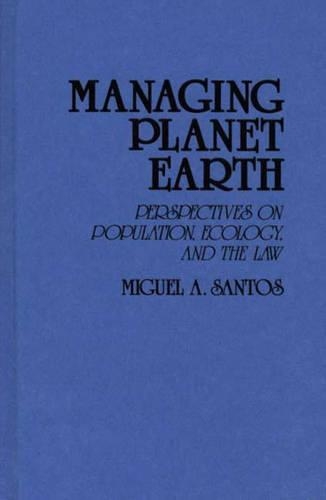
Managing Planet Earth: Perspectives on Population, Ecology, and the Law
(Hardback)
Publishing Details
Managing Planet Earth: Perspectives on Population, Ecology, and the Law
By (Author) Miguel A. Santos
Bloomsbury Publishing PLC
Praeger Publishers Inc
19th July 1990
United States
Classifications
Tertiary Education
Non Fiction
The environment
344.046
Physical Properties
Hardback
184
Description
Society cannot increase beyond its ability to acquire natural resources or to dispose safely of pollutants. One need not be an ecologist or environmental scientist to understand the dangers implicit in an uncontrolled degradation of the environment. Calculating how many people each individual nation should have and determining the means by which politically various populations will be controlled calls for difficult decisions. This book provides a concrete, easily understood, and realistic analysis of the scientific and legal dimensions of environmental stability. Miguel A. Santos outlines the current international ecological crises and defines them as the most serious threat to international world order and ecological stability. The book is divided into five sections beginning with an examination of the ecological characteristics of human population and a discussion of population policies in developing and developed nations. This section is followed by the construction of an analytic framework for the interaction of society with the environment. Further chapters provide an overview of natural resources and pollution and the criteria for determining the earth's carrying capacity for humans. The final section considers the problems and prospects of international law and environmental protection. Although written for ecologists, environmental scientists, demographers, political scientists, economists, and lawyers, this book is not limited to them. Anyone interested in the relationship between the environment and society will find this book instructive and provocative.
Reviews
Although intended as an introduction to the relationship between environment and society, the focus of this volume is on the exponential character of human population growth and the 'carrying capacity' sustainability of the biosphere in the face of that growth as exemplified by pollution and adverse impacts to transboundary resources. Taken as a broad overview of the causes and consequences of global warming, ozone layer depletion, and the need to protect against species extinction, this book could be a useful addition to environmental studies curricula if supplemented by more specialized works on these issues. The author's attempt to forge a comprehensive assessment of an 'anthroposystem's' capacity for sustainability is not entirely convincing but does not detract from the value of the discussion of the issues, based on a board (though unfortunately not always current) review of available literature. For example, carbon dioxide emissions from industrial activity may affect the sustainability of the atmosphere but are not necessarily proportional to population growth within nations. Trained as a lawyer and biologist, Santos has the breadth to tackle an array of issues but not without some sacrifice to depth. The concluding chapter on international law and global cooperation could benefit from case studies on 'Regional Seas' or other agreements. Undergraduate collections.-Choice
The author explores the scientific and legal aspects of the international ecological situation. 'Chapter 1 examines the ecological characteristics of human population, such as exponential growth and carrying capacity. This chapter also includes a discussion of the population policies in developing and developed nations. The objective of chapter 2 is to construct an analytic framework for the interaction of society with the environment. An overview of natural resources and pollution in the context of ecological process is presented. The criteria for determing the earth's carryiung capacity for humans are evaluated in the third chapter. Chapter 4 proposes a synergistic model for determining the earth's carrying capacity. The final chapter....considers the problems and prospects of international law and environmental protection.''-Population Index
"The author explores the scientific and legal aspects of the international ecological situation. 'Chapter 1 examines the ecological characteristics of human population, such as exponential growth and carrying capacity. This chapter also includes a discussion of the population policies in developing and developed nations. The objective of chapter 2 is to construct an analytic framework for the interaction of society with the environment. An overview of natural resources and pollution in the context of ecological process is presented. The criteria for determing the earth's carryiung capacity for humans are evaluated in the third chapter. Chapter 4 proposes a synergistic model for determining the earth's carrying capacity. The final chapter....considers the problems and prospects of international law and environmental protection.''"-Population Index
"Although intended as an introduction to the relationship between environment and society, the focus of this volume is on the exponential character of human population growth and the 'carrying capacity' sustainability of the biosphere in the face of that growth as exemplified by pollution and adverse impacts to transboundary resources. Taken as a broad overview of the causes and consequences of global warming, ozone layer depletion, and the need to protect against species extinction, this book could be a useful addition to environmental studies curricula if supplemented by more specialized works on these issues. The author's attempt to forge a comprehensive assessment of an 'anthroposystem's' capacity for sustainability is not entirely convincing but does not detract from the value of the discussion of the issues, based on a board (though unfortunately not always current) review of available literature. For example, carbon dioxide emissions from industrial activity may affect the sustainability of the atmosphere but are not necessarily proportional to population growth within nations. Trained as a lawyer and biologist, Santos has the breadth to tackle an array of issues but not without some sacrifice to depth. The concluding chapter on international law and global cooperation could benefit from case studies on 'Regional Seas' or other agreements. Undergraduate collections."-Choice
Author Bio
MIGUEL A. SANTOS is an Associate Professor of Ecology and Biology at Baruch College of the City University of New York. He is the coordinator of the Environmental Studies Program there and has developed a series of courses and seminars on environmental issues.
